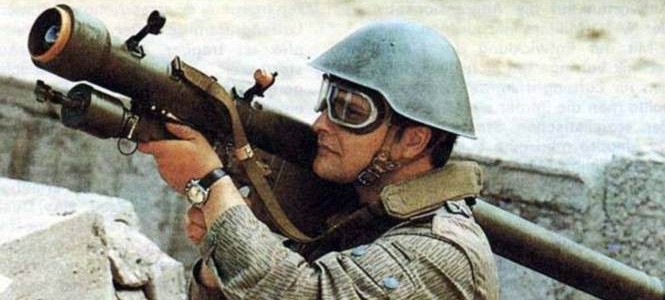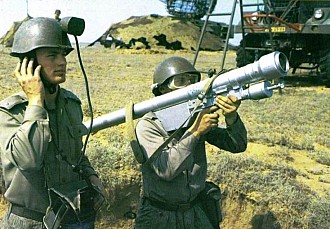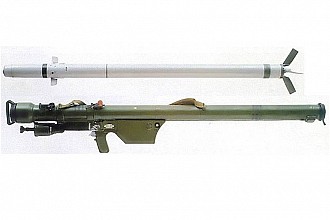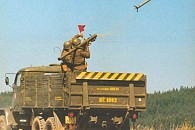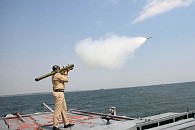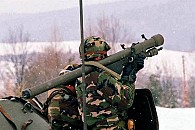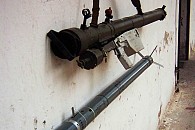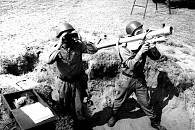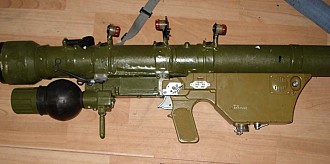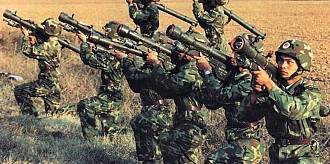Air defense / MANPADS / 9K32 Strela -2 (SA-7 Grail)
9K32 Strela -2 (SA-7 Grail)
General Facts
- TYPE
Man portable SAM system - ORIGIN
 USSR
USSR - NICKNAMES
SA-7 Grail (NATO reporting name)
SA-N-5 Grail (NATO reporting name)
SAM-7
CA-94 (Romanian production)
Hwasung-Chong (North Korean production) - DESIGNED
1960's - DESIGNER
KBM Kolomna - PRODUCTION
1968 - present - PRODUCERS
 USSR - KBM Kolomna
USSR - KBM Kolomna
Licensed production:
 Bulgaria - VMZ
Bulgaria - VMZ
 North Korea - state arsenals
North Korea - state arsenals
 Romania - Arsenalul Armatei
Romania - Arsenalul Armatei
 Serbia - Yugoimport-SDPR
Serbia - Yugoimport-SDPR
 Yugoslavia
Yugoslavia - QUANTITY
Unknown - UNIT COST
Unknown - CHARACTERISTICS
 Low production cost
Low production cost
 Easy to use
Easy to use
 Seeker easily fooled by flares
Seeker easily fooled by flares
 Limited lethality warhead
Limited lethality warhead
 Can only engage approaching or receding targets
Can only engage approaching or receding targets
 Limited missile speed and agility
Limited missile speed and agility
Introduction
The 9K32 Strela-2 is a Cold War era man portable SAM system. In the West it is known by the NATO reporting name SA-7 Grail. The 9K32 was developed as a more capable alternative to anti-aircraft guns for engaging fighter jets. The Strela-2 was the first Soviet MANPADS and became the most widely used system in the world.
Layout
The Strela-2 has a conventional design. It is an infrared guided missile with the seeker in the nose. This is followed by the warhead section and the rocket engine. A booster launches the missile from the gripstock launcher and provides initial velocity. The missile has four small wings at the front for steering and larger folding wings near the nozzle for stability. The gripstock launcher consists of a launch tube, sight unit, battery unit and trigger group.
Firepower
The Strela-2 uses an infrared seeker that proved rather easy to mislead with flares. The warhead is also rather small. Only receding fighter jets can be engaged. The original Strela-2 has a maximum range of 3.4 km and ceiling of 1.5 km. The improved Strela-2M uses a higher thrust propellant to reach a range of 4.2 km and ceiling of 2.3 km. The improved seeker in the Strela-2M allows all aspect engagement of helicopters and propellor aircraft.
Mobility
The Strela-2 is a very mobile system as the missile and its gripstock launcher are man portable, even over longer ranges. The system is operated by a single person. A four round launcher is used on ships of various sizes.
Users
The Strela-2 was adopted in large quantity by Soviet forces. Even with improved models such as Strela-3 and Igla the Strela-2 remained in use for a long time. The Strela-2 was exported in large quantities and has been produced in numerous nations with or without license. This makes the Strela-2 the most ubiquitous MANPADS in the world. It has been used in various conflicts from the 1970's to present day with mixed success. The Strela-2 is commonly encountered in Eastern Europe, the Middle East, Asia, Africa and South America.
9K32 launcher
The original Strela-2uses the 9P53 gripstock. The Strela-2M uses the more automated 9P58 gripstock, making operating the weapon simpler. Both use the same type of battery.
Besides the gripstock launcher the Strela-2M was also adopted for naval use on a four round launcher. The missile itself remains unchanged. The four round naval setup has the NATO reporting name SA-N-5 Grail.
9K32 missile
9K32 Strela-2: The 9K32 is the original missile introduced in 1968. It has the NATO reporting name SA-7A. It was soon replaced in production by the more capable 9K32M. The 9K32 uses the 9P53 gripstock.
9K32M Strela-2M: The 9K32M is an improvement over the 9K32 introduced in 1970. It has the NATO reporting name SA-7B. Compared to the 9K32 the 9K32M has a longer range, improved speed, all aspect engagement of helicopter and propellor aircraft and faster engagement with more auotmated 9P58 gripstock.
9K32M Strela-2M/A: An improved version of the 9K32M produced in Yugoslavia. Using newer electronics the guidance section has been reduced in size and weight. This allowed the warhead to increase in size accordingly.
- Specifications:
- 9M32
- 9M32M
- Strela-2M/A
| Type | Surface to air missile |
|---|---|
| Diameter | 72 mm body |
| Length | 1.420 m |
| Weight | 9.15 kg |
| Guidance | Single channel passive infra-red homing seeker |
|---|---|
| Warhead | HE-Frag, 1.17 kg, impact fuze |
| Propulsion | Single-stage solid propellant rocket motor plus ejection motor |
| Speed | 430 m/s average, 600 m/s maximum |
| Range | 0.8 to 3.4 km |
|---|---|
| Altitude | 50 m to 1.5 km |
| Engagement envelope | max target speed is 220 m/s receding |
| Remarks | 9P53 gripstock weighs 4.17 kg 12 to 15 second self-destruct time |
| Type | Surface to air missile |
|---|---|
| Diameter | 72 mm body |
| Length | 1.438 m |
| Weight | 9.6 kg |
| Guidance | Single channel passive infra-red homing seeker |
|---|---|
| Warhead | HE-Frag, 1.17 kg, impact fuze |
| Propulsion | Single-stage solid propellant rocket motor plus ejection motor |
| Speed | 430 m/s average, 630 m/s maximum |
| Range | 0.8 to 4.2 km |
|---|---|
| Altitude | 30 m to 2.3 km |
| Engagement envelope | max target speed is 260 m/s receding, 150 m/s approaching |
| Remarks | 9P58 gripstock weighs 4.95 kg 15 to 19 second self-destruct time |
| Type | Surface to air missile |
|---|---|
| Diameter | 72 mm body |
| Length | 1.44m |
| Weight | 9.85 kg |
| Guidance | Single channel passive infra-red homing seeker |
|---|---|
| Warhead | HE-Frag, 1.32 kg, contact and grazing fuze |
| Propulsion | Single-stage solid propellant rocket motor plus ejection motor |
| Speed | 500 m/s average |
| Range | 4.2 km approaching and 2.8 km receding |
|---|---|
| Altitude | 30 m to 2.3 km |
| Engagement envelope | max target speed is 260 m/s receding, 150 m/s approaching |
| Remarks | 9P58 gripstock weighs 4.95 kg |

